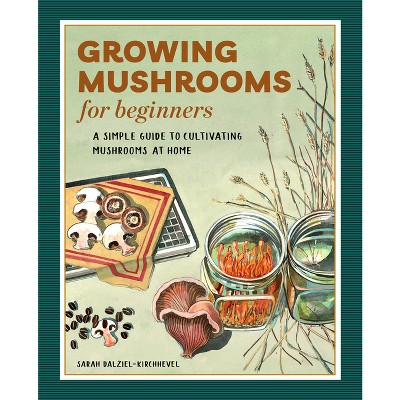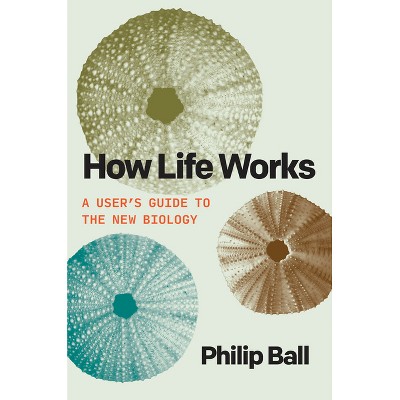Sponsored

The Book of Minds - by Philip Ball (Hardcover)
$24.49Save $1.51 (6% off)
In Stock
Eligible for registries and wish lists
Sponsored
About this item
Highlights
- Popular science writer Philip Ball explores a range of sciences to map our answers to a huge, philosophically rich question: How do we even begin to think about minds that are not human?
- About the Author: Philip Ball is a freelance writer and broadcaster whose many books on the interactions of the sciences, the arts, and the wider culture include Bright Earth, Curiosity, Patterns in Nature, How to Grow a Human, The Modern Myths, and, most recently, The Elements, all also published by the University of Chicago Press.
- 512 Pages
- Science, History
Description
About the Book
"In this book, popular science writer Philip Ball surveys a range of sciences to map our answers to a big, philosophically rich question, one with practical and ethical consequences for today. How do we even begin to think about minds that are not human? Sciences from astronomy to biology, computer science to neuroscience, are mapping the mind in their own disciplinary territories, and Ball pulls the pieces together so that we can appreciate the full picture-the "mindscape" or "space of possible minds." This map makes plain what sorts of minds we might expect to find in the universe. By plotting properties of mind without prioritizing the human, he sheds welcome, new light on a host of fascinating questions: What moral rights should we afford animals? Can we communicate with them? Should we worry that AI is going to take over and run society according to its own agenda? If there are intelligent aliens out there, how would we know? Could we communicate with them? Should we? Understanding the mindscape also reveals ways of making advances in understanding some of the most challenging questions in contemporary science: What is thought? What is consciousness? And what (if anything) is free will? Before Ball turns to other minds, however, he addresses the human mind: what is it? Is it different from the brain? From one person to the next? In this fascinating book of minds, we come to better know our own"--Book Synopsis
Popular science writer Philip Ball explores a range of sciences to map our answers to a huge, philosophically rich question: How do we even begin to think about minds that are not human? Sciences from zoology to astrobiology, computer science to neuroscience, are seeking to understand minds in their own distinct disciplinary realms. Taking a uniquely broad view of minds and where to find them--including in plants, aliens, and God--Philip Ball pulls the pieces together to explore what sorts of minds we might expect to find in the universe. In so doing, he offers for the first time a unified way of thinking about what minds are and what they can do, by locating them in what he calls the "space of possible minds." By identifying and mapping out properties of mind without prioritizing the human, Ball sheds new light on a host of fascinating questions: What moral rights should we afford animals, and can we understand their thoughts? Should we worry that AI is going to take over society? If there are intelligent aliens out there, how could we communicate with them? Should we? Understanding the space of possible minds also reveals ways of making advances in understanding some of the most challenging questions in contemporary science: What is thought? What is consciousness? And what (if anything) is free will? Informed by conversations with leading researchers, Ball's brilliant survey of current views about the nature and existence of minds is more mind-expanding than we could imagine. In this fascinating panorama of other minds, we come to better know our own.Review Quotes
"The Book of Minds helped me better adjust my perception of the fast-evolving world of artificial intelligence. And for me, the key was first to change my perception of 'minds.' The book, which talks about all kinds of minds, from humans to animals to machines and extraterrestrials, gives you a framework for looking past your instinctive tendency to view things through the lens of your own mind and experience."-- "TechTalks"
"Writer and broadcaster Ball investigates how we might perceive the mind if we did not put humans at the centre of our understanding. Highlighting that other cultures have attributed 'minds' to everything from rocks and rivers to trees and the weather, he argues that we should look beyond humans to truly understand what a mind encompasses. Combining neurology, philosophy, computer science and artificial intelligence, it's a fascinating and illuminating account."-- "Observer (Guardian UK)"
"Ball . . . urges us to explore 'the space of possible minds', rather than making the human mind, as pre-Copernican astronomers did the world, central and unique."-- "Spectator"
"With ambition and patience . . . Ball explores the parameters and functions of actual, virtual, and possible minds. The journey begins with humans and our fellow organisms on Earth (including plants and fungi) and ends with machine-based minds (artificial intelligence) and minds beyond our grasp (extraterrestrials and even God). The Book of Minds addresses everything from intelligence and consciousness to agency and free will. In doing so, Ball risks biting off more than we can chew. And yet the book reads swiftly and smoothly. Organized into ten generous chapters, the book often feels like the educated rambling of a passionate dilettante. Ball's take is wide and balanced, likely to please the demigods of mainstream academe while veiling valiant minority reports in its interstices."-- "Science"
"An impressive investigation of the various dimensions of what we call 'the mind' with much discussion of what sorts of beings might have minds. The book surveys views of a variety of philosophers and scientists with the breadth of knowledge you would expect of prolific science author Ball. . . . The Book of Minds is a highly interdisciplinary work that nicely weaves together ideas from various disciplines that address matters of mind. The book is well-written and accessible, with a clear presentation of the major issues, including the intriguing topic of minds beyond the boundaries of our planet. . . . A fascinating introduction to the many different aspects of mind with intriguing discussion of who might have them."-- "Metascience"
"This volume invites readers to reclaim the idea of mind as an essential scientific concept, and then challenges our common ideas about what mind is. This trip takes us through human cultural differences and human neurodiversity, priming readers to start thinking about minds different from one's own. What follows is a deeper investigation of what, following Aaron Sloman, Ball calls the Space of Possible Minds. The author calls for a Copernican revolution in thinking about mind that decenters the human, and even one that decenters the animal... By inviting readers to escape their own minds and imagine different ways of being minded, this book offers an essential step forward in the Copernican revolution that the author hopes to see. It is highly recommended."-- "Quarterly Review of Biology"
"Despite its humorous. . . subtitle, in this book popular science writer Ball offers an engaging text on the philosophy of mind. His discussion of mind tap-dances between scientific and philosophical theories of mind and brings both to bear on classic and contemporary problems regarding the nature of minds, as well as problems about ascertaining which, if any, non-human animals have minds."-- "Choice"
"The Book of Minds is an extremely thoughtful, well-written, and entertaining survey of current views about the nature--and existence--of minds. While fairly light in tone and often humorous, the book itself is quite serious, and Ball does an excellent job of explaining difficult or abstruse concepts (from quantum mechanics to evolution to neuroscience) in clear language. Omnivorous in its consideration of topics and resistant to dogmatism, Ball's book is a sustained, intelligent meditation on questions of deep scientific and human importance."--David Sepkoski, Thomas M. Siebel Chair in History of Science at the University of Illinois at Urbana-Champaign, author of "Catastrophic Thinking: Extinction and the Value of Diversity from Darwin to the Anthropocene"
"Ball argues that we must look beyond our own brains and delve into the minds of other creatures if we want to truly understand ourselves and comprehend the possibility of alien or machine intelligence."-- "New Scientist, "Don't Miss""
"Ball's synoptic overview of all the sorts of minds that may exist brings together a huge wealth of ideas and facts, presenting them in a digestible and engaging form. Beginning with a discussion of what we mean by mind and what seems notable about human minds, he considers, in turn, various sorts of animals, plants, animal colonies, AI, aliens, and God, before wrapping up with a chapter on the problem of free will. A valuable introduction to scientific and philosophical work on the varieties of mindedness."--Luke Roelofs, Center for Mind, Brain, and Consciousness, New York University, author of "Combining Minds: How to Think about Composite Subjectivity"
"Peering into other putative minds--animal, plant, AI, alien--Ball breaks the narcissistic trap of our sapiocentrism, our default assumption that the world is ours first, and only later should we condescend to find a little space for the rest of creation. . . . Ball is the laureate of curiosity and a one-stop source of wisdom. This book will teach you a lot about minds; but it will also make you marvel at the capacious and sagacious one possessed by its author."-- "Prospect"
"In The Book of Minds: How To Understand Ourselves and Other Beings, From Animals to AI to Aliens, science writer Philip Ball explores the minds or mind-like qualities that seem to exist in the world, and how best to make sense of it all when the science of subjective experience remains so uncertain."-- "Storytelling Animals"
"A most thought-provoking book. . . . Packed with loads of information on the behavior of animals representing diverse species--ranging from various mammals, including optimistic pigs and aesthetic dogs, to tool-making birds, bees and "hive minds," intelligent alien octopuses, plants, machines, and other entities--this wide-ranging book is a gem. It opens up the door to a pluralistic view of what is a mind, that there isn't one kind of mind in a wide range of nonhumans and other entities, that we're not on top of the list of minded beings, and that there's no reason to compare different kinds of minds to ours."-- "Psychology Today"
"Comprehensive and far-ranging. . . . This extensive tome will be a must-read for those with a keen interest in psychology, philosophy, and cognitive science, and for those who want to embark on a deep dive into the significance of the mind."-- "Library Journal"
"A journey into the concept of the mind, mixing neurology, philosophy, technology, and other disciplines. Although everyone has a mind, few experts agree on its makeup. Ball delivers a fine investigation of the possibilities. . . . Many of his topics are among the hottest in neuroscience today, explored by scores of academics and popularizers such as Oliver Sacks, Antonio Damasio, and Daniel Dennett. Building on their theories and others, Ball makes a useful addition to the literature. A difficult subject lucidly illuminated, if not fully explained."-- "Kirkus Reviews"
"Ball, a former editor at Nature, attempts to conceptualize the makeup of minds truly alien to our own, including those of plants, robots, and fungi. He provides a definition of what it means to have a mind (it's all about an entity's particular experience of being itself), and in doing so, illuminates much of what makes human minds unique."-- "Publishers Weekly"
"The award-winning science writer [Ball] explores the diversity of thinking minds, from our human ones to those of mammals, insects, computers, and plants."-- "Bookseller"
About the Author
Philip Ball is a freelance writer and broadcaster whose many books on the interactions of the sciences, the arts, and the wider culture include Bright Earth, Curiosity, Patterns in Nature, How to Grow a Human, The Modern Myths, and, most recently, The Elements, all also published by the University of Chicago Press. His book Critical Mass won the 2005 Aventis Prize for Science Books. Ball is also a presenter of Science Stories, the BBC Radio 4 series on the history of science. He trained as a chemist at the University of Oxford and as a physicist at the University of Bristol, and he was an editor at Nature for more than twenty years. He lives in London.Dimensions (Overall): 9.1 Inches (H) x 6.1 Inches (W) x 1.4 Inches (D)
Weight: 1.94 Pounds
Suggested Age: 22 Years and Up
Number of Pages: 512
Genre: Science
Sub-Genre: History
Publisher: University of Chicago Press
Format: Hardcover
Author: Philip Ball
Language: English
Street Date: June 28, 2022
TCIN: 1006098640
UPC: 9780226795874
Item Number (DPCI): 247-45-0744
Origin: Made in the USA or Imported
If the item details aren’t accurate or complete, we want to know about it.
Shipping details
Estimated ship dimensions: 1.4 inches length x 6.1 inches width x 9.1 inches height
Estimated ship weight: 1.94 pounds
We regret that this item cannot be shipped to PO Boxes.
This item cannot be shipped to the following locations: American Samoa (see also separate entry under AS), Guam (see also separate entry under GU), Northern Mariana Islands, Puerto Rico (see also separate entry under PR), United States Minor Outlying Islands, Virgin Islands, U.S., APO/FPO
Return details
This item can be returned to any Target store or Target.com.
This item must be returned within 90 days of the date it was purchased in store, shipped, delivered by a Shipt shopper, or made ready for pickup.
See the return policy for complete information.
Frequently bought together

$8.49
MSRP $14.99
Buy 1, get 1 50% off select books
2 out of 5 stars with 1 ratings
















